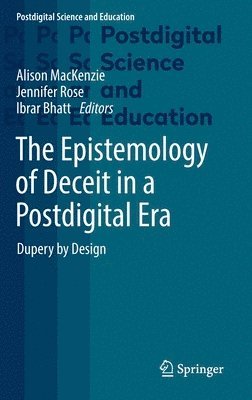
- Format
- Inbunden (Hardback)
- Språk
- Engelska
- Serie
- Postdigital Science and Education
- Antal sidor
- 296
- Utgivningsdatum
- 2021-08-04
- Förlag
- Springer Nature Switzerland AG
- Dimensioner
- 234 x 156 x 19 mm
- Vikt
- ISBN
- 9783030721534
- 640 g
Epistemology of Deceit in a Postdigital Era
Dupery by Design
- Skickas från oss inom 7-10 vardagar.
- Fri frakt över 249 kr för privatkunder i Sverige.
Passar bra ihop
De som köpt den här boken har ofta också köpt Let Them Theory av Mel Robbins (inbunden).
Köp båda 2 för 1801 krKundrecensioner
Fler böcker av författarna
-
Developing Digital Scholarship
Alison MacKenzie, Lindsey Martin
-
Mastering Digital Librarianship
Alison MacKenzie, Lindsey Martin
-
Love in the Age of Autism
Gayle Delong, Jonathan Rose, Jennifer Rose
-
Academics Writing
Karin Tusting, Sharon McCulloch, Ibrar Bhatt, Mary Hamilton, David Barton
Övrig information
Alison MacKenzie's academic background is in Philosophy of Education. She is the Director of the Masters programme for Special Educational Needs and Inclusion at Queen's University, Belfast. She is interested¿in how¿injustice and inequality are reproduced and sustained by¿forms of ignorance, testimonial and hermeneutical injustices, lack of access to important capitals such as linguistic capital, and by¿the ways in which¿ordinary vices are often overlooked as important sources of injustice, such as cruelty, misogyny, or hypocrisy. ¿ Jennifer Rose's academic background is in Philosophy of Education. She is primarily interested in epistemology, epistemic practices, related psychologies, how they foster or hinder social justice initiatives, and how education can respond. She completed her PhD¿ at Queen's University, Belfast with her thesis focused on knowledge and its role in creating and sustaining injustices. Her professional background is entrepreneurial focused on course development and delivery in a corporate lifelong learning context. ¿ Ibrar Bhatt is a Lecturer in Education at Queen's University Belfast. He specialises in research and teaching related to writing and literacy as a social practice, digital literacies, and contemporary digital epistemologies. He has also published on the fields of digital literacy, epistemologies of trust online, and research methods. He is also a member of the Governing Council of the Society for Research into Higher Education, and a convener of its Digital University Network. He is an Executive Editor for the journal Teaching in Higher Education.
Du kanske gillar
-
Peak Human
Johan Norberg
Häftad


